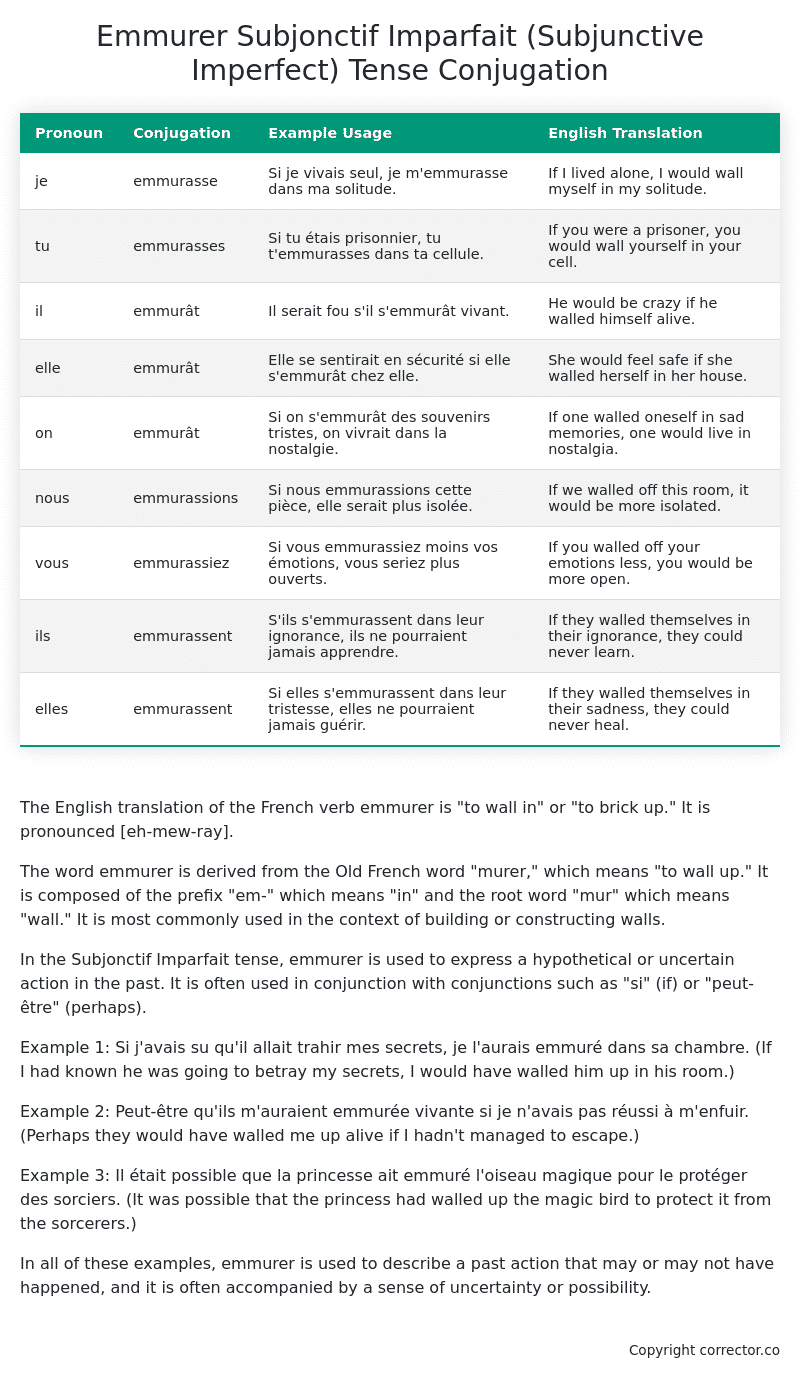Subjonctif Imparfait (Subjunctive Imperfect) Tense Conjugation of the French Verb emmurer
Introduction to the verb emmurer
The English translation of the French verb emmurer is “to wall in” or “to brick up.” It is pronounced [eh-mew-ray].
The word emmurer is derived from the Old French word “murer,” which means “to wall up.” It is composed of the prefix “em-” which means “in” and the root word “mur” which means “wall.” It is most commonly used in the context of building or constructing walls.
In the Subjonctif Imparfait tense, emmurer is used to express a hypothetical or uncertain action in the past. It is often used in conjunction with conjunctions such as “si” (if) or “peut-être” (perhaps).
Example 1: Si j’avais su qu’il allait trahir mes secrets, je l’aurais emmuré dans sa chambre. (If I had known he was going to betray my secrets, I would have walled him up in his room.)
Example 2: Peut-être qu’ils m’auraient emmurée vivante si je n’avais pas réussi à m’enfuir. (Perhaps they would have walled me up alive if I hadn’t managed to escape.)
Example 3: Il était possible que la princesse ait emmuré l’oiseau magique pour le protéger des sorciers. (It was possible that the princess had walled up the magic bird to protect it from the sorcerers.)
In all of these examples, emmurer is used to describe a past action that may or may not have happened, and it is often accompanied by a sense of uncertainty or possibility.
Table of the Subjonctif Imparfait (Subjunctive Imperfect) Tense Conjugation of emmurer
| Pronoun | Conjugation | Example Usage | English Translation |
|---|---|---|---|
| je | emmurasse | Si je vivais seul, je m’emmurasse dans ma solitude. | If I lived alone, I would wall myself in my solitude. |
| tu | emmurasses | Si tu étais prisonnier, tu t’emmurasses dans ta cellule. | If you were a prisoner, you would wall yourself in your cell. |
| il | emmurât | Il serait fou s’il s’emmurât vivant. | He would be crazy if he walled himself alive. |
| elle | emmurât | Elle se sentirait en sécurité si elle s’emmurât chez elle. | She would feel safe if she walled herself in her house. |
| on | emmurât | Si on s’emmurât des souvenirs tristes, on vivrait dans la nostalgie. | If one walled oneself in sad memories, one would live in nostalgia. |
| nous | emmurassions | Si nous emmurassions cette pièce, elle serait plus isolée. | If we walled off this room, it would be more isolated. |
| vous | emmurassiez | Si vous emmurassiez moins vos émotions, vous seriez plus ouverts. | If you walled off your emotions less, you would be more open. |
| ils | emmurassent | S’ils s’emmurassent dans leur ignorance, ils ne pourraient jamais apprendre. | If they walled themselves in their ignorance, they could never learn. |
| elles | emmurassent | Si elles s’emmurassent dans leur tristesse, elles ne pourraient jamais guérir. | If they walled themselves in their sadness, they could never heal. |
Other Conjugations for Emmurer.
Le Present (Present Tense) Conjugation of the French Verb emmurer
Imparfait (Imperfect) Tense Conjugation of the French Verb emmurer
Passé Simple (Simple Past) Tense Conjugation of the French Verb emmurer
Passé Composé (Present Perfect) Tense Conjugation of the French Verb emmurer
Futur Simple (Simple Future) Tense Conjugation of the French Verb emmurer
Futur Proche (Near Future) Tense Conjugation of the French Verb emmurer
Plus-que-parfait (Pluperfect) Tense Conjugation of the French Verb emmurer
Passé Antérieur (Past Anterior) Tense Conjugation of the French Verb emmurer
Futur Antérieur (Future Anterior) Tense Conjugation of the French Verb emmurer
Subjonctif Présent (Subjunctive Present) Tense Conjugation of the French Verb emmurer
Subjonctif Passé (Subjunctive Past) Tense Conjugation of the French Verb emmurer
Subjonctif Imparfait (Subjunctive Imperfect) Tense Conjugation of the French Verb emmurer (this article)
Subjonctif Plus-que-parfait (Subjunctive Pluperfect) Tense Conjugation of the French Verb emmurer
Conditionnel Présent (Conditional Present) Tense Conjugation of the French Verb emmurer
Conditionnel Passé (Conditional Past) Tense Conjugation of the French Verb emmurer
L’impératif Présent (Imperative Present) Tense Conjugation of the French Verb emmurer
L’infinitif Présent (Infinitive Present) Tense Conjugation of the French Verb emmurer
Struggling with French verbs or the language in general? Why not use our free French Grammar Checker – no registration required!
Get a FREE Download Study Sheet of this Conjugation 🔥
Simply right click the image below, click “save image” and get your free reference for the emmurer Subjonctif Imparfait tense conjugation!

Emmurer – About the French Subjonctif Imparfait (Subjunctive Imperfect) Tense
Formation
Common Everyday Usage Patterns
Interactions with Other Tenses
Subjonctif Présent
Indicatif Passé Composé
Conditional
Conditional Perfect
Summary
I hope you enjoyed this article on the verb emmurer. Still in a learning mood? Check out another TOTALLY random French verb conjugation!


